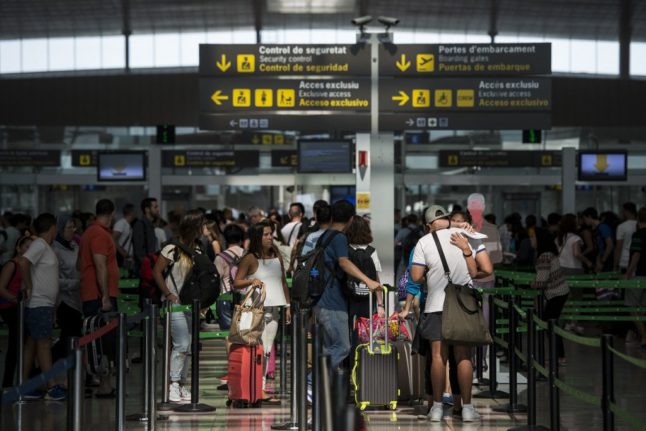Although Spain has not yet implemented this nationally, recently some foot passengers have been surprised at the information being asked for by Spanish immigration officials at the border from Gibraltar and would be positively shocked if they were refused entry into Spain.
As a non EU member and not from one of the 26 Member States of the Schengen area, Britons entering Spain could well have certain requirements with which to comply:
– A valid passport or travel document. Your passport must be less than 10 years old on the day you enter (check the ‘date of issue’) and valid for at least 3 months after the day you plan to leave (check the expiry date). Also, check your passport is stamped if you enter or exit the Schengen area through Spain as a visitor
– A visa if you are subject to the Spanish visa regime
– Proof of accommodation. A document that shows where you will be staying during your time in Spain
– A return or round-trip ticket or proof of onward travel if you do not plan to return to your home country at the end of your stay in Spain
– Documents proving your purpose of entry
The 90 days in 180 days Schengen rule applies to third country nationals whether they are travelling for tourism purposes, visiting friends or family, in transit, on business, for medical reasons, for study or for cultural reasons, sports and film crews.
The border officials are quite entitled to ask: ‘What is your purpose for visiting Spain? How long do you intend to stay in Spain? Where are you going to stay in Spain? How are you going to financially support yourself during your time here in Spain?’ So, these questions have to be satisfied with proof.
There is no indication of specific criteria immigration officials use to determine whether to ask third-country nationals for this extra proof and seems to be at the discretion of each individual border official.
As stated earlier, these requirements have only been requested recently from some third-country foot passengers entering Spain via the Gibraltar border, but under the Schengen Border Code, Spain is entitled to implement these measures at any time.
What documents British tourists can in theory be asked prove when visiting Spain
1) Round-trip flight itinerary. A document that shows you have a booked flight, to enter and leave Spain. This document should specify flight numbers, dates, and your details
2) Proof of accommodation by means of a hotel reservation
3) Proof of sufficient financial means. A foreigner who seeks to enter the territory of Spain needs to attest to having at least €100 per day, with a minimum of €900 per person regardless of the intended duration of the stay
4) A personal letter of invitation which explains why you are visiting, with whom you are staying and for how long
As a tourist you will have proof of hotel/self catering accommodation booked and as a visitor to a friend or family member you might be asked for the letter of invitation but this depends on your reasons for visiting.
Some questions that remain are whether the €900 minimum per person applies also to minors or what proof of accommodation British tourists travelling in motorhomes would be asked to produce.
How can you prove your financial sufficiency?
– A personal bank statement indicating your financial movements (for at least the last 3 months)
– Credit card
– Cash
– Traveller’s cheques
– Payslips
– Proof of employment
– Supporting document to attest sponsor’s readiness to cover your expenses during your stay
– Proof of prepaid accommodation
– Document about private accommodation
– Proof of prepaid transport
Means of subsistence, is regulated by the Regulation (Ec) No 810/2009 of The European Parliament and of The Council of 13 July 2009, establishing a Community Code on Visas also known as “Visa Code” Article 14(c).
Why is it €100 a day per day for tourists in Spain?
According to Article 5(3) of the Schengen Border Code: “means of subsistence shall be assessed in accordance with the duration and the purpose of the stay and by reference to average prices in the Member State(s)concerned for board and lodging in budget accommodation, multiplied by the number of days stayed.”
Invitation letter
If you are staying with a friend or family member that person will effectively be responsible for you financially and will guarantee that you do not overstay the 90 days and must invite you in writing to stay with them for a given duration.
Overstaying
Should you be tempted to stay longer than the permitted 90 days in any 180 days it could mean a fine will be imposed, you could be deported or even banned from entering the Schengen Zone for a specific amount of time.
There is not a common policy for all Schengen Member States and Spain has not, as yet, imposed such penalties but could do so at any time. Germany imposes the strictest immigration laws and Greece applies the highest fines for overstaying.
Short-stay Schengen visa extensions are permitted by the regulation of the European Parliament and of the Council (EC) No. 810/2009 of 13 July 2009 establishing a Community Code on Visas (Journal of Laws of the EU of 2009 L243/1) but you must have a strong valid reason.
According to the Schengen visa policy, acceptable reasons to extend a Schengen short-stay visa are only the following – Late Entry, Humanitarian Reasons, Force Majeure, Important Personal Reasons.
There are differences in requirements between the reasons for entering and Brexpats in Spain International can help you with all these requirements – visas, competitive quotes for approved insurance via one of our sponsors, letters of invitation and visa extensions.



 Please whitelist us to continue reading.
Please whitelist us to continue reading.
Member comments